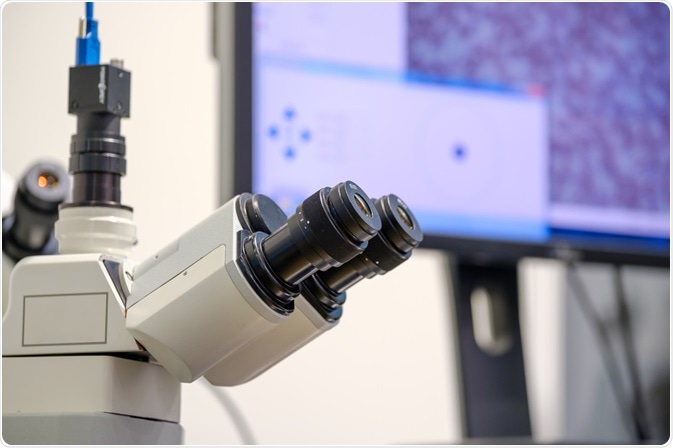Digital pathology is a concept that has been around for over a century, however, it is only in the past decade that technological advances have allowed for its widespread adoption.
The market for digital pathology is growing all the time. The global market was valued at $767.6 million in 2019 and is expected to grow rapidly, at a CAGR of 11.8% between now and 2027.
The continued growth of this market is heavily related to the numerous benefits it brings to the scientific community, discussed below.

Image Credit: Anton Gvozdikov/Shutterstock.com
The benefits of digital pathology
There are a number of advantages related to the use of digital pathology, these advantages are helping the practice become more widely adopted, and commonplace in lab settings.
Improved analysis
To begin with, digital pathology offers improved analysis. It provides algorithms to be used for automated slide analysis, which is objective, rapid, and accurate. It also allows scientists instant access to previous related cases, as data storage for long-term predictive analytics.
Reduction in errors
Next, the use of digital pathology means fewer errors are made, mistakes such as misidentification are reduced, and because the images are stored digitally, breakages do not threaten data.
Enhancing imaging
The practice also offers better views of the samples, it allows scientists to magnify to slides and look at them from different angles. It also allows for annotation and the measurement of multiple regions of interest.
Improved productivity
Productivity is one of the main benefits that has helped digital pathology gain popularity. It does this in several ways. Firstly, it improves workflow by enabling wide-scale collaboration, offering central storage of data and easy access, minimizing the need for outsourcing and facilitates automation.
Also, it improves turnaround times by enabling rapid access to digital slides held in the archives, speeding up the processes of retrieving, organizing, and matching data.
Digital pathology processes address the major contributors to wasted time in pathology labs. It stops scientists from having to search through large volumes of physical slides, sometimes kept in archives, to locate the one they need.
It also reduces the time required to set up the microscope in the exact way it was when studying a previous sample.
The need to physically gather other team members at the same time to inspect samples is eradicated, and the old ways of sharing a photo of a sample that could be very time-ineffective are replaced by the rapid sharing capabilities of digital pathology.
More innovation
Innovation is another key benefit of digital pathology. The process facilitates more innovation by encouraging pathologists to become specialized, giving scientists access to better tools and information, and sharing practices with broader geographies.
Better patient outcomes
A main role of pathologists is to establish a diagnosis for a patient based on their tissue samples, leaving a critical decision up to a single person, or small group of people. Diagnosis in this way is vulnerable to human error, even if the person reviewing the samples is an expert, they are still not immune from human error.
Digital pathology can help reduce human error as well as producing precise diagnostic results in short turnaround time. The processes involved in digital pathology allow it to speed up routine tasks without reducing the quality of the execution of each task.
There are many scenarios where doctors need an accurate analysis of a tissue sample instantly. In these cases, waiting for tissue biopsies to be processed in traditional ways may be too slow, and have detrimental impacts on the health outcomes for patients.
With digital pathology, even if the required specialist is not physically available on site, the images of the sample can be sent instantaneously to specialists in locations around the world to enable rapid analysis. This capability of digital pathology could theoretically save lives.
Reduces long-term costs
Finally, digital pathology can greatly reduce costs in the long-term. This is because it can speed up the workflow, eliminate the need for couriers, reduce the requirement for scientists to travel, and reduce time and resources spent analyzing and interpreting data.
Serval years ago, researchers based in Pittsburgh, Pennsylvania, investigated how the adoption of digital pathology systems allowed healthcare institutions to reduce costs. They found that a significant reduction in spending, equating to $12.4 million, was observed just five years after implementing the system. This works out at an annual saving of $219,000.
The study attributed much of this cost-saving effect to the system allowing staff time to be better allocated, increasing productivity all round.
Summary
Digital pathology has become firmly established in labs all around the world, and its numerous benefits have helped drive its rapid expansion, which is predicted to continue momentum over the coming years.
Its advantages of cutting costs, improving analysis, patient outcomes, and productivity, reducing errors, and enhancing imaging and innovation are likely to continue to propel its widespread adoption.
Sources:
- Ho, J., Kuzmishin, J., Montalto, M., Pantanowitz, L., Parwani, A., Stratman, C., Ahlers, S., Aridor, O. and Fine, J., 2014. Can digital pathology result in cost savings? A financial projection for digital pathology implementation at a large integrated health care organization. Journal of Pathology Informatics, 5(1), p.33. https://www.ncbi.nlm.nih.gov/pmc/articles/PMC4168664/
- Pantanowitz, L., Sharma, A., Carter, A., Kurc, T., Sussman, A. and Saltz, J., 2018. Twenty years of digital pathology: An overview of the road travelled, what is on the horizon, and the emergence of vendor-neutral archives. Journal of Pathology Informatics, 9(1), p.40. https://www.ncbi.nlm.nih.gov/pmc/articles/PMC6289005/
- The Value of Digital Pathology. Available at: digitalpathologyassociation.org/blog/the-value-of-digital-pathology/
Further Reading
Last Updated: Mar 30, 2020